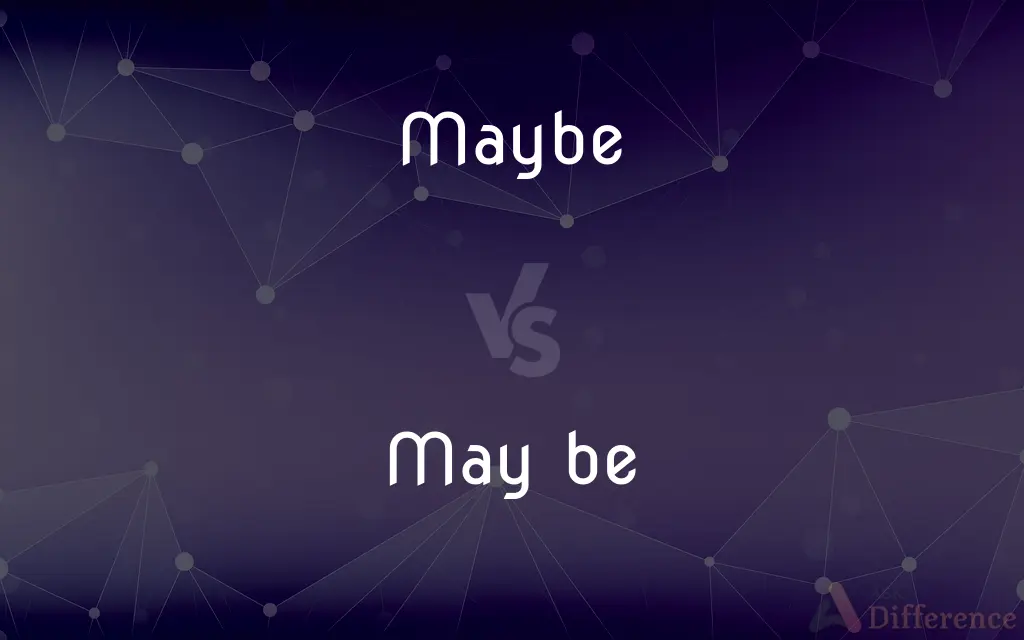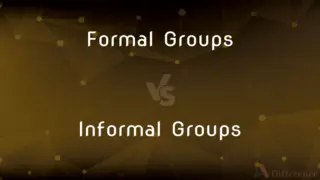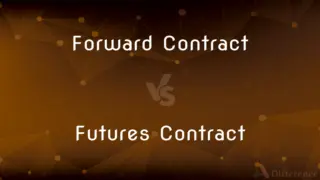Maybe vs. May be — What's the Difference?
By Tayyaba Rehman — Published on December 15, 2023
"Maybe" is an adverb suggesting uncertainty, whereas "may be" is a verb phrase indicating a possibility.

Difference Between Maybe and May be
Table of Contents
ADVERTISEMENT
Key Differences
"Maybe" is a single word that functions as an adverb. It introduces the idea of uncertainty or possibility. In contrast, "may be" consists of two words, a modal verb ("may") and the main verb ("be"), together expressing a potential state or condition.
When you use "maybe," you're often expressing a conjecture or assumption. On the other hand, "may be" is more about stating a potential reality or fact.
"Maybe" usually precedes a statement to imply doubt. In contrast, "may be" typically requires an additional component, such as an adjective or noun, to complete the meaning.
In some sentences, it's easy to differentiate between the two: "Maybe it'll rain" versus "It may be raining soon." The former shows speculation while the latter indicates potential occurrence.
It's essential to discern between "maybe" and "may be" because while they sound similar, their functions and implications in a sentence are distinct.
ADVERTISEMENT
Comparison Chart
Type
Adverb
Verb phrase
Function
Indicates uncertainty
Indicates possibility
Example
Maybe I'll come.
That may be the right answer.
Structure
Usually precedes a statement
Typically requires a complement
Meaning Implication
Conjecture or assumption
Potential reality or fact
Compare with Definitions
Maybe
An adverb suggesting doubt or uncertainty.
Maybe she knows the answer.
May be
Expresses potential identity.
That may be the person we met last week.
Maybe
A term expressing a lack of commitment.
Maybe we'll go there next week.
May be
Indicates a potential state or condition.
It may be cold outside.
Maybe
Indicating possibility.
Maybe this is what we've been searching for.
May be
Suggests potential suitability.
That may be a good idea.
Maybe
Used to indicate uncertainty or possibility
We should maybe take a different route. Maybe it won't rain.
May be
Used to describe a possible situation.
He may be at the store.
Maybe
An uncertainty
There are so many maybes involved in playing the stock market.
May be
Reflects uncertainty about an event's occurrence.
The meeting may be postponed.
Maybe
An uncertain reply
It's better to receive a fast and honest no than a drawn-out maybe.
Maybe
Modifies a verb, indicating a lack of certainty: it may be (that)...
Maybe I was imagining it, but I could swear that the dog understood what I was saying.
Maybe
Perhaps that is true expressing no commitment to a decision or a neutral viewpoint to a statement.
Maybe
Certainly.
Maybe not the best idea.
Maybe
Possible; uncertain.
Maybe
(informal) Something that is possibly true.
Maybe
(informal) An answer that shows neither agreement nor disagreement.
The results of the poll were inconclusive. We got two yeses, three nos, and four maybes.
Maybe
(informal) A future event that may or may not happen.
About your raise: it's a big maybe.
Maybe
Perhaps; possibly; peradventure.
Maybe the amorous count solicits her.
In a liberal and, maybe, somewhat reckless way.
Maybe
Possible; probable, but not sure.
Then add those maybe years thou hast to live.
Maybe
Possibility; uncertainty.
What they offer is mere maybe and shift.
Maybe
By chance;
Perhaps she will call tomorrow
We may possibly run into them at the concert
It may peradventure be thought that there never was such a time
Maybe
Used to show ambivalence.
Maybe it's good, maybe it's bad.
Maybe
A tentative agreement.
Maybe I'll think about it.
Common Curiosities
What part of speech is "maybe"?
"Maybe" is an adverb.
How can I decide between using "maybe" or "may be"?
Consider the function: use "maybe" as an adverb to indicate uncertainty and "may be" as a verb phrase for a possible condition.
Is "maybe" more about personal conjecture?
Yes, "maybe" often expresses personal speculation or assumption.
Does "maybe" always indicate doubt?
While "maybe" often suggests doubt, it can also express possibility or a tentative agreement.
Which is more definite, "maybe" or "may be"?
Neither is definite; both convey different levels of uncertainty or possibility.
Do other languages have similar distinctions like "maybe" and "may be"?
The exact distinction is English-specific, but many languages have ways to convey uncertainty and possibility.
How is "may be" structured in a sentence?
"May be" consists of a modal verb ("may") followed by the main verb ("be").
What kind of complement does "may be" typically require?
"May be" usually requires an adjective, noun, or adverbial phrase to complete its meaning.
Can "maybe" and "may be" be used interchangeably?
No, they serve different functions in a sentence and cannot be used interchangeably.
Can "may be" start a sentence?
Yes, it can. For example: "May be tomorrow will be a better day."
Which is older, "maybe" or "may be"?
Both have deep roots in English, but "may be" as two separate words likely predates the compound "maybe."
Is "maybe" a formal word?
"Maybe" is neutral and can be used in both formal and informal contexts.
Is "may be" always about future possibilities?
No, it can describe current states or conditions as well.
Can "may be" be used without a complement?
Rarely. "May be" typically needs a complement to convey complete meaning.
Can "may be" describe an identity?
Yes, for instance: "That may be the artist we saw last year."
Share Your Discovery

Previous Comparison
Formal Groups vs. Informal Groups
Next Comparison
Forward Contract vs. Futures ContractAuthor Spotlight
Written by
Tayyaba RehmanTayyaba Rehman is a distinguished writer, currently serving as a primary contributor to askdifference.com. As a researcher in semantics and etymology, Tayyaba's passion for the complexity of languages and their distinctions has found a perfect home on the platform. Tayyaba delves into the intricacies of language, distinguishing between commonly confused words and phrases, thereby providing clarity for readers worldwide.











































